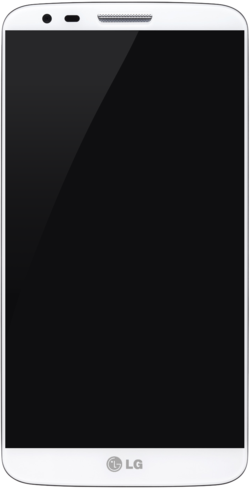 | |
 LG G2 in White | |
| Brand | G series |
|---|---|
| Manufacturer | LG Electronics |
| Type | Smartphone |
| First released | September 12, 2013 |
| Predecessor | LG Optimus G |
| Successor | LG G3 |
| Related | LG G2 Mini LG G Pro 2 LG G Flex Nexus 5 |
| Form factor | Slate |
| Dimensions | 138.5 mm (5.45 in) H 70.9 mm (2.79 in) W 8.9 mm (0.35 in) D |
| Weight | 143 g (5.0 oz) |
| Operating system | Original: Android 4.2.2 "Jelly Bean" Last: Android 5.0.2 "Lollipop" |
| System-on-chip | Qualcomm Snapdragon 800 MSM8974 |
| CPU | 2.26 GHz Qualcomm quad-core Krait 400 |
| GPU | Adreno 330 |
| Memory | 2 GB RAM |
| Storage | 16 GB or 32 GB |
| Removable storage | microSDXC up to 64GB (South Korean variant only) |
| Battery | Non-removable Li-Pol 3,000 mAh Removable Li-ion 2,610 mAh (South Korean variant) |
| Rear camera | Sony IMX135 Exmor RS CMOS 13 MP OIS, F2.4, LED flash [1] |
| Front camera | 2.1 MP, F2.6 |
| Display | 5.2 in (130 mm) diagonal IPS LCD 1920x1080 (424 ppi) with Gorilla Glass 2 |
| Connectivity | List
|
| Website | https://web.archive.org/web/20130916212006/http://www.lg.com/us/mobile-phones/g2 |
The LG G2 is an Android smartphone developed by LG Electronics. Serving as a successor to 2012's Optimus G and the 2013 Optimus G Pro phablet, the G2 was unveiled at a press event in New York City on 7 August 2013, and first released in September 2013. The G2 is primarily distinguished by software features that LG billed would "learn" from users, a high fidelity sound system designed to produce higher quality audio, a 5.2 in (130 mm) 1080p IPS LCD screen with technology that the company claimed would improve energy efficiency and reduce the size of the bezel around it, along with the unique placement of its power and volume keys—eschewing their typical location on the edge of a smartphone by placing them on the rear below the camera lens.
Contents
- Release
- Specifications
- Hardware
- Software
- Model variants
- Accessories
- Reception
- Pre-release
- Critical reception
- Sales
- See also
- References
- External links
The device was released to mostly positive reception; the G2 was universally praised for LG's efforts to produce a more seamless and compact design that nonetheless maximized screen size, its high performance, the quality of its display and primary camera, along with its long-lasting battery. Critics were divided on certain aspects of its design, such as its rear button layout, and its plastic chassis. Which was panned for closely resembling recent Samsung Galaxy products and being a regression from the glass-based chassis of the Optimus G. Similarly, its software and user interface were praised for their usability and large number of customization options, some reviewers felt that the software suffered from feature creep and contained notable usability regressions in comparison to "stock" Android.
Sales of the G2 exceeded LG's estimates; in late December 2013, a Korean news agency reported that at least 3 million units of the G2 had been sold worldwide.
